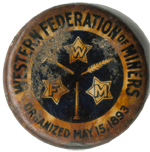 —————
—————
Hellraisers Journal – Wednesday April 22, 1903
Colorado City, Colorado –Mill and Smeltermen’s Union on Strike, Part III
From The Miners Magazine of April 1903:
THE STRIKE IN COLORADO CITY.
[Part III of V: Moyer Submits Terms for Arbitration]
As soon as it became known throughout the state that the militia had been ordered to Colorado City, organized labor in every hamlet, village and city of the state, acted as a unit, in carrying out the instructions that were conveyed in the address that was issued by President Moyer and Secretary-Treasurer Haywood. The first petition that was presented to the legislature in condemnation of the governor, was laid upon the table by a vote of twenty-nine to nineteen. The members of the legislature did not seem to realize that organized labor throughout the state was thoroughly aroused, and when petition after petition came into the chambers of the law-makers, the corporation-owned lackeys of the Peabody administration felt “a change of heart.
The governor for a few days played the role of the parrot to Manager MacNeil, and echoed the slogan of the corporations: “There is nothing to arbitrate.” “Nothing to arbitrate,” exclaimed the governor, when the state militia, at an expense of $1,500 per day are located at Colorado City, to give assistance to the mill trust in binding the shackles of a more galling bondage on the limbs of the serfs, who rebelled against czarism in Colorado. Nothing to arbitrate, when mill managers ride in $14,000 automobiles, and their employes live in hovels, surrounded by squalor of the most abject poverty? Nothing to arbitrate while misery is the legacy of the mill workers, and fabulous dividends, for the trust? Governor, in the language of the street, “you are a corker.” The sentiment of the people of Colorado was expressed in the numerous petitions that poured into the state capitol, and the governor showed symptoms of receding from his former position.
* * *
Sherman Bell, the adjutant general, who was recently appointed by the governor, at the urgent request of the Mine Owners’ Association, and whose salary in the capacity of adjutant general is $1,800 per year, plus $3,200, which is to be appropriated by the Mine Owners’ Association, has assumed the attitude of a military autocrat. This imperial bum hero, who won a questionable reputation in the Spanish-American war, by crawling behind the breastworks of black men, who stormed San Juan hill, vomited the burning lava of his pent-up indignation in the following words to a correspondent of the Denver Post:
You may say for me, in the most emphatic and unqualified terms, that while President Moyer, of the Western Federation of Miners, is in Denver carrying a white flag of truce and asking for the good offices of Governor Peabody to relieve him and his factional Coeur d’Alene followers from their present embarrassing predicament, he is acting with a double purpose here by waving a red flag under a black flag and at the same time is endeavoring to be relieved of any and all responsibility for the firing at our sentries by Moyer’s assassins and forcing his ideas of arbitration. There is nothing to arbitrate with us on this matter, and everybody concerned might just as well understand it. That is all there is to that.
Sherman Bell is not supposed to assume the duties of adjutant general until Gardner of “Wrath of God” and “Snowslide Fame,” steps down and out at the expiration of his term in the month of April. But Bell is anxious to impress the mine owners with the fact that their princely donation of $3,200 per annum in conjunction with the regular salary is duly appreciated, and that no effort will be spared on his part to fully meet their expectations in serving the interests of the corporations.
President Moyer, in the same issue of the Denver Post, which quoted the belligerent verbosity of Bell, had the following to say to a Post correspondent:
The Mill and Smeltermen’s union agreed to submit their differences to a board of arbitration, and were willing to abide by the decision of such a board. The terms submitted for arbitration by the Federation are as follows:
First—That eight hours shall constitute a day’s work in and around the mills.
Second—That all men now on strike or who shall have been discharged by the different milling companies for no reason other than that they were members of Colorado City Mill and Smeltermen’s union, be reinstated.
Third—That members of organized labor be not discriminated against, but be privileged to affiliate with a labor organization, and that they be not discharged for said affiliation.
Fourth—That the scale of wages, as set forth in the demands of the Mill and Smeltermen’s union be paid.
Fifth—The Colorado City Mill and Smeltermen’s union is willing to submit the above demands to a board of arbitration, selected as follows: The first member of the board to be selected by the governor or the mill managers; the second member to be selected by the Western Federation of Miners, and the third to be selected by the two; and the Colorado City Mill and Smeltermen’s Union No. 125, agrees to abide by the decision of the said board, providing that pending their deliberations, the state militia, armed guards, strike breakers and all pickets be withdrawn from in and around the above mentioned mills.
CHARLES MOYER,
Representing Mill and Smeltermen’s Union No. 125.

